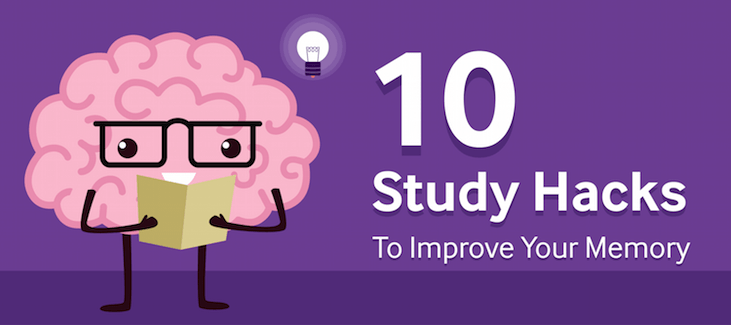10 Study Hacks to Improve Your Memory and Score in Your Exams
Struggle to recall information? Avoid drawing a blank during your exams with these fool-proof hacks to improve your memory.
Updated 23 Oct 2015

We've ALL suffered from this situation before — that one moment during your exams where you read the exam question and you're certain you know the answer, but just can't remember! For some reason, it's nowhere to be found in your head, even after all the memorising.
While it is completely normal to forget things we've learned before, there are many study hacks that you can adopt to improve your memory.
Over the years, I have received a lot of tips and advice from my professors and fellow peers in college, and I've compiled some of the best tried and tested methods that I've personally used before. Here are 10 study hacks to improve your memory to ace your exams!
1) Create mental associations through mind maps
One method that researchers have backed is mind mapping. As complicated as it may seem, it's actually really easy!
Mind maps are a visual representation of information, and are a great way to improve your understanding and memory. Say you need to memorise groups of elements in the periodic table. Start at the centre, and for each branch, write down the groups of elements. Expand each of the groups into more branches, filling them with things you need to learn, such as their properties, examples and chemical reactions.
The trick to mind maps is to use various colours, images and symbols so that your brain can recall key facts easily and quickly. Mind maps are also a good way to organise information into groups so that you can make sense of all the stuff that you need to learn.
Not sure how to create a mind map? Check out this simple guide here. Whether you prefer to do your mind maps by hand or an online tool like Coggle, it's entirely up to you!
2) Use a mnemonic device
Mnemonic (pronounced ni-mon-ik) is a memory aid that can help you recall information, and is especially useful for things that need to be memorised in order.
For example, let's say you need to remember the elements of Group 17 of the periodic table (halogens): Fluorine (F), Chlorine (Cl), Bromine (Br), Iodine (I), Astatine (At).
You can use the mnemonic "Fat Clown Bribed Innocent Athena", where each word represents the first letter(s) of the halogens, and will help you remember them in sequence.
Try to make your mnemonics silly and interesting, so that you are able to recall them better. The mind loves things that are out of the ordinary, so you are only limited by your own creativity!
Mnemonics aren't just useful for lists of things. You can also use them to memorise:
- Spelling of words: Emma faced a dilemma
- Equations: "Two Old Angels Skipped Over Heaven Carrying Ancient Harps": Tangent = Opposite/Adjacent; Sine = Opposite/Hypothenuse; Cosine = Adjacent/Hypothenuse"
- Value of numbers: Value of pi = "May I have a large container of coffee?" where the number of each word equals the numerals in pi, 3.1415927
3) Teach what you have learned
Now, I'm sure you've heard of this before, but is it really effective? Science say it's true!
Teaching someone else calls for a complete understanding of the concept. This is because when learning, we can fool ourselves into believing that we have a complete understanding of the material given even though we may have only scratched the surface.
By teaching someone else, it forces you to communicate your thoughts clearly and precisely, which makes your ideas more effective and well-structured in your head. Studies have found that students enlisted to tutor others are found to be able to recall information more accurately and apply it more effectively.
So when it comes to your exams, you will be prepared as your thoughts and knowledge can be easily translated in the written form, just as how you’ve done it before verbally!

4) Get loud
Another way to really help improve your memory and retain knowledge is to read out loud. I know this may seem like a very odd thing to do, especially if you're always studying in the library, but research has shown that talking aloud can improve retention substantially.
When you read out what you’re learning, something extraordinary happens. It's called the "production effect".
The mind has a way of remembering strange and peculiar things better than ordinary items. So when the words you read are translated into speech, your mind has the memory of hearing these words and also the knowledge of producing those items. This makes the study material that you spoke out loud more distinct than those you read silently.
But don't go overboard! The study also says that people who read everything aloud did not do as well as those who read some material silently and some material out loud. So what you should do is identify the important information that you need to memorise, and only read those aloud.
5) Re-write your study material
This is definitely a personal favourite.
Studies have shown that re-writing by hand requires different types of cognitive processing, and because writing notes by hand is cumbersome and slow, you tend to digest and summarise your notes into key points, capturing only the essence of the information.
Another trick is to imagine that your exam is an open book exam, but you can only bring in a single sheet of A4 paper, handwritten only. See if you can squeeze your entire course syllabus into just one sheet of paper, organising everything as best as you can. By the time you're done, chances are you would have already learned and memorised most of the material!
Apply for university with EduAdvisor
Secure scholarships and more when you apply to any of our 100+ partner universities.
Start now6) Memorise by chunking
When you have a steak for dinner, it’s really hard to put the entire steak in your mouth and swallow it. But when you cut it into bite-size pieces, you'll be able to finish it easily!
The truth is, our mind works in exactly the same way. Smaller, manageable units of information are much easier to process compared to a single big block. For example, dates are not recalled by 12101998, but rather 12/10/1998.
So when you're learning and revising, group your material into chunks and learn it over a period of time. By splitting your study material into smaller units, you will be able to learn more and retain information more effectively.
7) Study in a group
As the saying goes, two brains are better than one.
Studying in a group can help you collect new insights, since there is a higher probability that someone has a question that you may not have thought of. By sharing different ideas and resources, you get to learn various points of view from different people, and this can encourage critical thinking and creativity.
The key to having a successful study group (and not end up chatting about the latest gadget in the market or the newest cafes in town) is to ensure that you set out study goals and limit the group to about 3-4 people. A larger group may end up being too distracting, and setting goals will ensure that your group stays on track.
Do check out ExamTime as well. This is a useful tool for you and your study group when sharing resources and having discussions.
8) Test yourself with past year papers
Like many trial or percubaan exams that you've had in schools, past year papers are very helpful to practise your answers before going for the real thing.
Besides helping you practise your answers, past year papers help you retain the information that you've learned better. When you answer questions in a test, you’re basically training your mind to retrieve information. The more times you do so, the better your memory becomes!
Sites like Xtremepapers have past year papers of various courses for you to train your brain.
9) Take regular study breaks
Studies have shown that taking breaks in between studying helps to improve memory. The findings seem to show that seem to point that "your brain wants you to tune out other tasks so you can tune in to what you've just learned".
One of the ways which I personally use is the 50:10 technique. I focus on studying for 50 minutes and then proceed to take a break for 10 minutes. After my break, I’ll either continue studying the same subject or switch to another subject so I don’t feel like it’s repetitive.
So don't sit down for extremely long periods of time, forcing everything into your brain. The short break in between can actually help make new connections between the information that you've just learned and your older memories and knowledge.

10) Get enough sleep!
Now, I can’t stress this enough — sleep is absolutely crucial if you’re trying to learn and memorise stuff! Trust me, being sleep deprived isn't a badge of honour, it's a health risk.
Sleep helps you clear your mind, and if you don’t have sufficient sleep, your mind becomes murky and you’ll have trouble with your cognitive performance. In fact, your ability to learn and recall new information can drop by 40% if you don't have enough sleep!
This is because during a night of sleep, your brain goes back through recent memories and decides what to keep and what not to keep. So having enough sleep can help to strengthen your memories. Not only that, it seems that the brain also makes new and creative connections during sleep, which is why a good night's rest can help with problem-solving!






